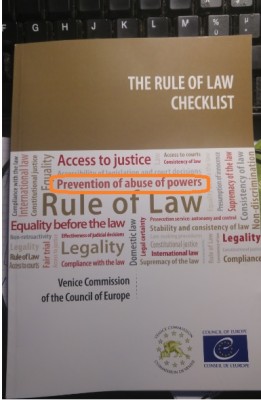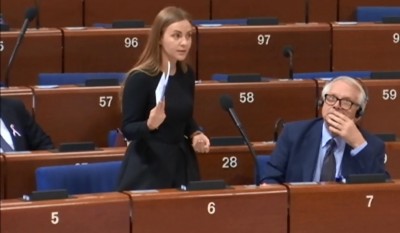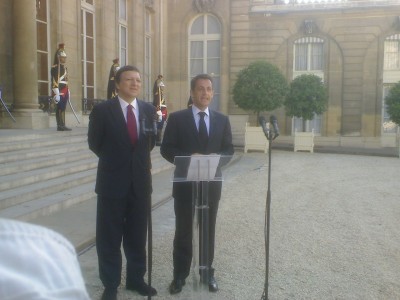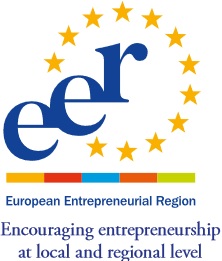 newsitems
newsitems  CoE Rule of Law Criteria include Eurofora idea on Dialogue with Citizens before important Decisions
CoE Rule of Law Criteria include Eurofora idea on Dialogue with Citizens before important Decisions
CoE Rule of Law Criteria include Eurofora idea on Dialogue with Citizens before important Decisions

*Strasbourg/CoE/Angelo Marcopolo/- The Parliamentary Assembly (PACE) of the PanEuropean Organisation for Democracy, Rule of Law and Human Rights, CoE, has just decided to Start Implementing, in real life, vis a vis all States and other Public Authorities, a List of Legal "Criteria" for "Rule of Law", which includes a Core part of "Eurofora"'s project on Dialogue with Citizens before Public Decisions affecting their Lives and/or Society at large (Comp. also : http://www.eurofora.net/newsflashes/news/eucoeabdcitizensinpublicdecisionmaking.html , etc) :
This is contained in a relevant "Check-List", drafted between 2012 - 2016, and re-Published on 2017, by the Prestigious PanEuropean CoE's Top Legal Experts' body known as "Venice Commission" for "Democracy + Human Rights through Law", currently Chaired by experienced former Long-Time CoE's Senior Officer, Jean-Claude Buqicchio, who actively participated in PACE's Debate.
PACE had invited (already from 2007) the Venice Commission's Top Legal Experts to Study the concept of "Rule of Law" (alias : "Rechts-Staat"/"Etat de Droit", etc) in Depth, and the latter Found that, despite some more or less differences, nevertheless, un "Consensus" seemed to Exist, among 47 CoE's Member States, Observers a.o., as far as it concerns its "Core Elements" :
They include not only "Legality" and "Certainty", as well as "Non-Discrimination and Equality", but also "Access to Justice", and, in particular, "Prohibition of Arbitrariness".
The latter, aiming to "Prevent Abuse (or Misuse) of Power", (aka : "Detournement de Pouvoir"), by "Public Authorities", concerns "Legal Restrictions to Discretionary Power", when "exerciced by the Executive in Administrative Action", (a Frequent Phenomenon in Modern Societies). It consists in "Mechanisms to Prevent, Correct and Sanction" any "Abuse of Discretionary Power", including the "Judicial Review of the Exercice of such Power" when it's "given to Officials".
In particular, "Public Authorities" must be "Required to Provide Adequate Reasons for their Decisions", especially "when they they Affect the Rights of Individuals". So that "the Failure to state (such) Reasons", should be "a Valid Ground for Challenging such Decisions in Courts".
This is contained in CoE's "Venice Commission" Top Legal Experts' "Rule of Law CheckList" ("Critères de l'Etat de Droit") Booklet, which was Endorsed by the Highest Political body of the PanEuropean Organisation : its Committee of Ministers and Printed 3 Times on 2016, the Use of which was, Yesterday Evening, strongly advised by CoE's Parliamentary Assembly's Legal/Human Rights Committee's new President, Ms Olena Sotnyk, (See relevant "Eurofora" Photo).
As it was clearly explained, during PACE's Plenary Debates Yesterday Evening, this concerns a set of Principles, more or less Common to All concerned Countries, but in Each of which, the Concrete Ways to Implement them, might appear to be quite Diversified, in real Practice.
In Substance, what is really Common, is that all this concerns the use of Discretionary Powers by Public Authorities (and/or "Private Actors in charge of Public Tasks"), when the take Decisions which Affect Citizens' Rights and/or Society at large. And the Scope on which Bears the Monitoring by independent Courts, is Not the concrete Content, the Conditions, and/or the Aim of a Decision, as such, But, rather, the Decision-Making Process :
- I.e., particularly its Internal, Logical aspects, as far as it concerns an "Obligation to Give Reasons", and the Reality, Legality, Pertinence or Sufficiency of such a Motivation, (including, f.ex., if it Replies Adequately, or Not, to eventual legitimate Objections with Arguments that the Affected Citizens might have raised, etc). No "Detournement de Pouvoir" or "Abuse of Power", i.e. No Misusing a Power given by the Law only for a concrete Aim, in fact, for slyly seeking to obtain another, illegitimate aim, etc.
+ At the same time, it includes relevant Key aspects of the External Procedure of a monitored decision taken by a Public Administration in order to Regulate one or another area, such as, f.ex. : To be "Debated Publicly" and "Adequately Justified", with, previously, "the Public having Access to the Draft", and "a Meaningful Opportunity to Provide Input", (as CoE's above mentioned Booklet stresses, Referring, f.ex., to relevant Official Documents of UNO's Human Rights Committee, of the OSCE, etc), i.e. at least an elementary "Procedure Contradictoire" (according also to French Administrative Law, etc), sometimes going as far as to speak also of "Citizens' participation in the conduct of Public Affairs, by exerting Influence through Public Debate" (UNHRC, 1996).
++ But also the Absence of Excessive Dis-Proportionality between the Measure taken by a Public Authority, compared to its Legal Aim, and the way it Affects the Citizens. An Estimation of the Impact of a planed Measure to Citizens' Rights, Compared to the General Interest Benefits expected from it, in order to "allow to strike a Fair Balance, between the various conflicting Interests at stake", (ECHR). At least, withOut any "Erreur Manifeste d' Appreciation" about that, (in French Administrative Courts' case-law), according to the usual denominations of relevant Judicial Monitoring on Public Administration's Decisions, in the real practice of several CoE's Member States, even of ECHR itself (on 2 out of those 3 points).
(Such Legal points have been extensively Analyzed by "Eurofora" Co-Founder's original Comparative Law University Research, already Started as Early as since 1980 -with a 1.000 pages-long Report, presented² by Strasbourg's Faculty of Law for a Prize awarded to PhD. Thesis, after written proposal by Paris II Universiy Professor Paul Amselek. But also more Recently, Since an active Participation in a landmark 2012 Scientific Colloquy at Strasbourg University, in cooperation with those of Rennes, Paris II, including a Report on a relevant Environmental Impact Committee's Public Debates with Citizens, set up by Michel Barnier when he was Minister, etc).
-------------------------------------
+ The Fact that such a Legal Structure of Relations between Citizens and Public Administrations is considered by the CoE as corresponding widely to a certain Level of Development in Modern Democratic Societies in general, throughout the whole World, and Not Only in Europe, became Obvious, inter alia, also by the inclusion, among the 9 Top Legal Experts on the basis of whose "Comments" CoE's Venice Commission adopted this "Rule of Law CheckList", also of a Member from the USA. While, in Addition, Yesterday's PACE's relevant Debate in Strasbourg included also Representatives from Morocco up to Canada and Other Non-European Countries. Moreover, in a Resolution Voted and Adopted at the Conclusion of Yesterday's Debate, PACE clearly Asks all Venice Commission's "Member and (even) Observer States", (several among which, notoriously are located also in Other Continents accross the World), to "actively ...Defend and Promote" this "Rule of Law Checklist", them too.
>>> However, the Most Important Decision taken Now by CoE's 47Member States-strong, PanEuropean Parliamentary Assembly , obviously is that this adopted 2017 Resolution, not only "Endorses" the "Rule of Law CheckList", but, Moreover, it also goes on to Add even its intention, for the 1st Time, to Start "Us(ing) it Systematically" , "particularly" ... in order to accurately Identify any structural and systemic (Legal) Problems in CoE's Member-States", whenever the Situations existing in them are checked by PACE's competent "Committees" on "Legal/Human Rights" affairs and/or its "Monitoring Committee", "on the Honouring of Obligations and Commitments by Member States".
=> I.e., in other words, it's as if PACE clearly and explicitly Decided, Now, in real Practice, to Start Using, at least from October 2017 onwards, that Venice Commission's "Rule of Law CheckList", (including the Above-Mentioned Key Legal Points), as if it had become a Legally Binding set of Rules nowadays !
+ For that purpose, PACE's Resolution also "invite(s)", Now, All "the National Parliaments and Government bodies", as well as "CoE's Secretary General", to "Systematically" "Refer" to, and/or "take into Account" that same "Rule of Law CheckList"'s Criteria, whenever the First have to work on various National "Reforms", or the Latter to make his "Annual Report on the Situation of Democracy, Human Rights and the Rule of Law in Europe", (as he Already Started to do so, from 2017).
>>> And, since, now, that "Rule of Law CheckList"'s "Criteria" have been Officially Adopted, Both by CoE's Parliamentary Assembly, and Secretary General, from 2017, (Comp. Supra), as they were Also Endorsed, from 2016, by CoE's inter-Governemental Committee of Ministers, following "Venice Committee"'s Independent Top Legal Experts on Constitutional Law, and Joined even by CoE's Congress of Local and Regional Authorities, etc, then, it concerns, practically, All Levels of Government : Local, Regional and National.
++ Furthermore, Advancing even anOher, Important Step towards "Eurofora"s Project, for Dialogue between Citizens and EU Institutions (including EU Parliament, etc) Before important Decisions are taken which seriously Affect their Lives and/or Society at large, CoE's PanEuropean Organisation for Democracy, Human Rights and Rule of Law's Parliamentary Assembly, (PACE), also Decided Now, to "invite" even "International and Regional Organisations, including ...the EU, to refer regularly to the Rule of Law Checklist" in their "work", as that Adopted Resolution adds.
Already, Experienced former Twice EU Ombudsman/Citizens' Defendor, Headquartered in Strasbourg, Professor Diamantouros had told "Eurofora" in the recent Past, that, After the Entry into Force of EU's Lisbon Treaty (2010+), his Intention to Start Using its General Clause (contained in EU's "Charter of Fundamental Rights") about "Good Administration", in order to Check EU Decisions' legality also from the Precise point of view highighted by "Eurofora" above, (Comp. f.ex.: ...).
And, Nowadays, even the Booklet with CoE's "Venice Commission"'s "Rule of Law CheckList", Published on 2016, (Comp. Supra), explicitly Refers to relevant "selected Standards", contained, f.ex., as far as "Hard Law" is concerned, also to "EU's Charter of Fundamental Rights (2009)", UNO's International Convent on Civil and Political Rights (1966), etc., and, as far as "Soft Law" is concerned, also to "EU Commission's Communication to EU Parliament and Council on "a New EU Framework, to Strengthen the Rule of Law" (2014), EU Council's Conclusions "on Fundamental Rights and Rule of Law, and on Commission's 2012 Report on the Application of EU's Charter of Fundamental Rights (2013)", as well as to the "EU Accession Criteria" ("Copenhagen Criteria"), etc. But also to OSCE's Copenhagen Conference "on the Human Dimension" (1989), as well as its Follow-up with a Similar "Moscow meeting Document" (1991), and OSCE's "Decision No. 7/08" about "Further Strengthening the Rule of Law in the OSCE Area (2008)". Concerning, particularly, "Eurofora"s Specific Viewpoint (Comp. Supra), CoE's "Rule of Law Checklist" refers, about "Preventioon of Abuse of Power", also to the "UN International Convenant on Civil and Political Rights' (1966) Article 17, about "Interference with Freedoms", as well as in Thematic UNO's Texts about "Migrants and their Families (1990)", "the Rights of the Child (1989)", etc., and even to "CoE's Committee of Ministers : "The CoE and the Rule of Law" (2008), UNO's "Universal Declaration of Human Rights (1948), Articles 9, 12, 17", etc.
Naturally, such Texts could also Inspire, in the foreseeable Future, EU's Court of Justice, at nearby Luxemburg, in parallel with ECHR in Strasbourg, at their respective Case-Law.
=> Therefore, PACE's Resolution, adopted Yesterday Evening, significantly Concludes by "Encourag(ing) Civil Society to Use the <<Rule of Law CheckList>>", in order to "objectively Assess Respect for the Rule of Law" in real, Everyday Practice.
>>> - "It's one of the Most Important Pieces of Work we have Ever done !", stressed with Emphasis, Yesterday Evening, the experienced President of the PanEuropean Commission for Democracy through Law, (alias CoE's "Venice Commission")
- Indeed, "the Rule of Law is Not Abstract, any more : We have just a Small Book", which, "in Reality, it's very Precious !", echoed further PACE's new Chair of its Legal/Human Rights Committee, MEP Olena Sotnyk, concluding a long Debate.

She was proudly Brandishing a Copy of that Booklet as if it was, mutatis-mutandis, somehing like the World-Famous ...Mao's little "Red-Book", notoriously used by Millions of People, during China's "Cultural Revolution", back in the 1960ies ...
=> Could, indeed, CoE be Launching, now, its own, Legal, and brand New, peaceful "Cultural Revolution" ?

Mao + People brandishing the "Red Book", on 1966, at Tien an men Square, (Photo in Historic German Exhibition of 2017, covered by N-TV)
---------------------------------------------------
Main Menu
Home Press Deontology/Ethics 2009 Innovation Year EU endorses EuroFora's idea Multi-Lingual FORUM Subscribers/Donors FAQs Advanced search EuroFora supports Seabird newsitems In Brief European Headquarters' MAPs CoE Journalists Protection PlatformBRIEF NEWS
- 00:00 - 02.06.2021
- 00:00 - 18.10.2020
- 00:00 - 19.06.2020
- 00:00 - 18.05.2020
- 00:00 - 20.04.2020
- 00:00 - 02.02.2020
- 00:00 - 09.12.2019
- 00:00 - 27.11.2019
- 00:00 - 16.11.2019
Popular
- Yes, we could have prevented Ferguson riots says World Democracy Forum's Young American NGO to ERFRA
- Spanish People Elect CenterRIGHT Majority with 1st Party and Total of 178 MPs (6 More than the Left)
- Pflimlin's vision
- The European Athletic "Dream Team", after Barcelona 2010 Sport Championship Results
- Source Conseil d'Europe à ERFRA: Debatre Liberté d'Opposants à Loi livrant Mariage+Enfants à Homos ?
- Head of BioEthics InterGroup, MEP Peter Liese : "Embryonic stem cell research reaching its END" !?
- Spain: Jailed Turkish Terror suspect with Explosive,Drones,Chechen accomplices stirs Merah+ Burgas ?
- UN Head Ban Ki Moon at CoE World Democracy Forum : - "Listen to the People !"
Latest News
- EUOmbudsmen Conference 2022: Digital Gaps affect People's Trust threaten EF Project on EU Future ?
- French Election : Black Out on Virus, but Obligation for Fake 'Vaccines" Challenged
- Both French Presidential Candidates point at "Humanism" in crucial times...
- France : Zemmour = Outsider may become Game Changer in Presidential + Parliamentary Elections 2022
- PACE President Cox skips Turkey Worst (Occupation) case compared to Russia (DeMilitarisation) query
Statistics
Посетителей: 58946071Archive
Login Form
Other Menu

- "Europe must be liberated from this undermining "wooden talk" of a "unique thought" which hampers democratic debates", stressed incoming EU Chairman, French President Nicolas Sarkozy, speaking to Journalists after his official meeting with EU Commission's President, Jose Barroso, at Elysee Palace in Paris
- "It's precisely because there are not enough Debates, that EU hasn't managed yet to make it clear to European citizens what is really at stake", he added, in an obvious reference to the latest Irish "No" in 2008, after a long series of similar, unprecedented events, from the 1st Majority Abstention to EU Parliament's Elections in 1999, repeated in 2004, to the Dutch and French "No" in 2005, etc.

- "This is not an easy period, but we shall act with determination, while also listening to Citizens' views", he promised.
Sarkozy's move came shortly before his opening Speech, next week in EU Parliament in Strasbourg, for the first Public Debate on the Priorities of the French EU Presidency (July - December 2008), and that's one of the reasons for which he significantly opened his EU Council's Chairmanship by welcoming at Elysee palace EU Parliament's President, German MEP Hans Gert Poettering at first..
The incoming EU Chairman was replying to Press Questions about rumours that controversial British EU Commissioner on Trade, Mandelson, was alone to drop an invitation to have a working Diner at Elysee palace, together with all other EU Commissioners and the French Government, only because he would have been upset for some critical points made earlier by President Sarkozy in defense of European Agriculture vis-a-vis its Foreign competitors.
But, as smiling Sarkozy played down Mandelson's reported refusal to debate, saying that he had to visit Marseille for a Ministerial meeting on Trade the next morning, and that "all our British friends are always welcome to taste a nice diner" in France, perhaps at another occasion..
- "It's urgent to win anew the trust of the People" : Lately, "the European ideal lost its momentum. Since several years, whenever Citizens are questioned on Europe, they react with reserves : They even have .. a tendency to reply "NO".. After this 3rd "No" of a People in some years, there is an Urgency to convince", added French Prime Minister Francois Fillon, after a meeting earlier the same day of all Ministers with EU Commissioners, followed by an interview with Barroso
"According to recent Polls, only 30% of French people believe that the European construction is a source of hope. It's only a poll, but we all now quite well, that, since 2005, it's dangerous to neglect these alarming signals, as it would be dangerous to treat with contempt the Irish "No", Fillon warned.
"We all have a common duty to prove to the European Citizens who have doubts, that EU is more useful, more necessary, than ever" : And "that EU can take decisions needed in order to respond to European or Global challenges", the Prime Minister concluded.
- "We believe, together with President Sarkozy, that EU should open debates on all issues of direct, concrete interest to Citizens", confirmed later to EuroFora the Head of France's governing party (UMP), Patrick Devedjan, after his speech to the European People's party (EPP) Study Days in Paris (2 - 4 July 2008).
He didn't deny that one of them is Turkey : - "Public Opinion in France is very much unfavorable to Turkey's EU bid, and President Sarkozy has said that several times", he told EuroFora.
From European Central Bank's controversial policies on Euro's value, to EU Enlargement Strategy, etc., issues of obvious importance to EU Citizens will be plenty, next week in EU Parliament in Strasbourg, before President Sarkozy launches the debates on EU 2008 French chairmanship's priorities on Thursday.


















